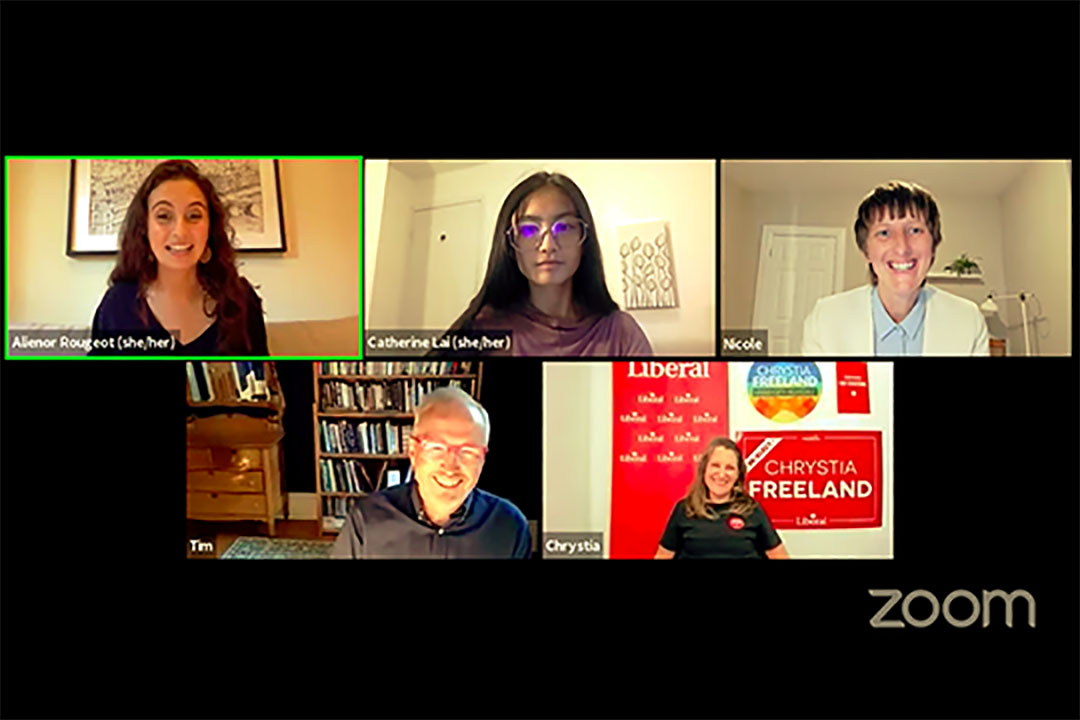On September 8, federal election candidates for University—Rosedale gathered for a debate on climate change. The event was part of the 100 Debates on the Environment initiative organized by the non-profit GreenPAC, which holds 100 debates on climate change across Canada over the course of two days. The debate was co-hosted by University of Toronto Students’ Union (UTSU) Vice-President, Public & University Affairs Catherine Lai.
Deputy Prime Minister Chrystia Freeland of the Liberal party, Nicole Robicheau of the New Democratic Party (NDP), and Tim Grant of the Green party attended the event. Steven Taylor, the Conservative candidate, was absent despite being invited.
The candidates debated their immediate plans to combat the climate crisis, discussing issues such as reducing emissions, protecting the environment, and working with Indigenous peoples. They also discussed how to create a greener future through the creation of new jobs and the promotion of clean technology.
A great challenge
In their introductory remarks, all three candidates noted the urgency of the climate crisis and the importance of climate solutions to their platforms, with Freeland calling it “the existential challenge of our times.”
Much of the discussion centered on immediate concerns like reducing emissions, protecting biodiversity, and banning plastics.
Freeland addressed these issues by referring to the Liberal party’s goals, which she described as “ambitious, achievable, and fully costed.” They would include a hard cap on emissions from the oil and gas industry, aiming for a 40 to 45 per cent reduction on all emissions countrywide by 2030.
Freeland added that the Liberal party is committed to protecting 25 per cent of Canada’s land and oceans by 2025. It has already increased the amount of protected ocean area to 14 per cent and it is also in the process of completely banning plastics.
Robicheau responded that the NDP plans on reducing emissions by 50 per cent, and that they would personally advocate to increase that number to 60 per cent. They also spoke of the importance of making improvements to the life cycle of plastics, in addition to banning single-use plastics.
In his response, Grant said that the Green party is the only party with a platform that could actually achieve the Paris Agreement’s goals, and that the country actually needs to reduce its emissions by more than 60 per cent, given the slow progress made in the last decade.
“We probably need more ambitious plans, because some are going to not achieve the targets that we want,” Grant concluded. He also said that the challenge in regulating single-use plastics is not only banning them but discontinuing Canada’s practice of dumping its garbage in other countries.
Every candidate expressed a commitment to investing in Indigenous land and reconciling with Indigenous peoples. Robicheau and Grant also emphasized that Indigenous peoples’ voices need to be heard while developing climate policy.
Paving the way forward
The debate also featured discussions about ways of getting to a greener future, including incentives for green technology and creating new jobs.
In response to a question on how they would approach the potential of green energy, Freeland stated that the Liberals would invest into clean energy. She added that clean energy industries produce great job opportunities for young Canadians.
Robicheau emphasized that building the green infrastructure that will lead Canada into the future will also create new jobs. Grant agreed with these strategies, but noted that a guaranteed livable income would be an important strategy in providing stability to Canadians while transitioning to a new economy.
Furthermore, the candidates all noted that necessary steps such as retrofitting — the process of adding new technology to old infrastructure — could serve as a tremendous opportunity if done at a large scale.
All candidates were adamant about the importance of youth participation in climate change initiatives going forward. Robicheau specifically stated that the NDP would decrease the voting age to 16, and Grant said the Green party would create a ‘youth corps’ that would help achieve the party’s environmental targets and restore Canada’s ecosystems.


